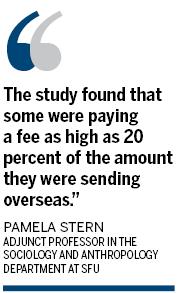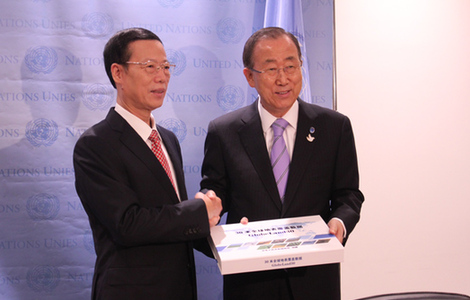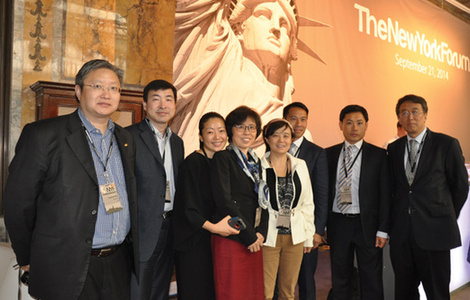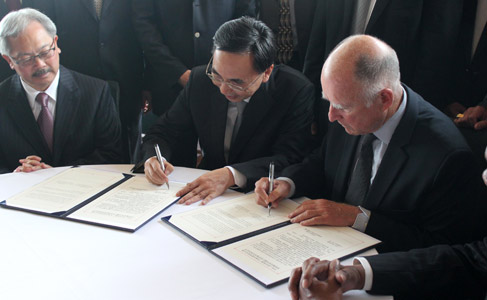Sending money costs huge
Updated: 2014-09-20 06:49
By PAUL WELITZKIN in New York(China Daily Canada)
|
||||||||
On any day in Canada, Chinese immigrants head for a business that transfer money back to their homeland. It is a simple act but one with huge economic implications for the immigrants and their family members.

Most immigrants use a money transfer agent. In Canada there is very little regulation of these businesses and the fees they charge for the service. A study conducted by students at Simon Fraser University (SFU) in British Columbia found that fees charged for small sums like $100 can be as high as 20 percent. The exchange rate for the currencies involved is determined by the money transfer agent with virtually no regulatory oversight.
Transferring funds internationally is a $529 billion yearly business, according to the World Bank. In Canada, immigrants sent back $24 billion (C$26.33 billion) in 2012, according to the bank. Of that amount, the largest share - $3.9 billion – went to China. After China, India ($3.5 billion) and the Philippines ($2 billion) were the largest recipients of remittances from Canada.
Immigrants can choose a bank or money transfer agent to send money home. Among the more well-known outlets is Western Union and there are thousands of independent money transfer agents. All of them must register with the Financial Transactions and Report Analysis Centre of Canada or Fintrac.
"We require all money transfer businesses to register with us and we publish this registry online," said Peter Lamey, a Fintrac spokesman. In Quebec, money transfer outlets must register and receive a license from the Quebec Securities Agency, according to spokesman Sylvain Theberge. "This requirement was started in 2012 and we require the business to obtain a license. However, we do not have any power over the fees that are charged by the business. That is considered a function of the free market."
Pamela Stern, an adjunct professor in the sociology and anthropology department at SFU, oversaw a group of undergraduate students who conducted a study of remittances in the Vancouver area for a research methods class.
According to the study, the World Bank suggests that the cost of sending money including fees and exchange rate premiums should not exceed 5 percent of the money remitted. For example, if someone is sending $500 to China, the fee should be about $25. If that person is charged 20 percent, the fee increases to $100.
"The study found that some were paying a fee as high as 20 percent of the amount they were sending overseas," said Stern. "The fee becomes very important when you consider most immigrants are sending small amounts, perhaps $100 or $200 every two weeks. If the fee is 20 percent, it can really add up."
"While all remitters pay fees to send money, the research revealed that immigrants, whose families are the most in need of support, necessarily send small sums of money frequently. These senders are most disadvantaged by the lack of government regulation on remittance fees and exchange rate premiums," the study said.
Stern said senders are most concerned about security when sending funds back home. "They want to know that when they send $100 to their family, the money arrives and is available to them. Fees and exchange rates aren't as important as security," she said.
Because of the disparity in fees, Stern believes the time is right for governmental action. "I would like to see provincial oversight on this," she said. "We would all benefit if there were rules. We can't make people make good financial decisions, but we shouldn't make it hard for them to do so."
Most of Canada's major banks offer money transfer services and some post their fees online. "The problem with that is most immigrants don't trust banks," Stern said. "Language is not as big a factor as it might have been 15 or 20 years ago as most banks now have bilingual employees who can communicate with customers in just about any language now."
Western Union, based in Englewood, Colorado, is one of the largest money-transfer companies in the world. Western Union completed 242 million consumer-to-consumer transactions worldwide in 2013, according to the company's corporate communications department. In an email statement, Western Union said China is one of the top outbound countries from Canada.
Western Union charges $10 to send up to $500 to China from Canada. Amounts over $500 and up to $1,000 incur a $15 fee. Western Union said it earns a small margin from foreign exchange. If the pay-out currency is different from the currency the customer sends, the funds need to be converted. Western Union calculates its rate of exchange based on commercially available interbank rates plus a small margin.
Most rates of exchange are adjusted several times daily in line with prevailing rates on the global financial markets. Any difference between the currency exchange rate offered to consumers and the currency exchange rate received by Western Union (and in some instances its agents) will be kept by Western Union in addition to the transfer fees.
Alan de Braun is with the Consultative Group on International Agricultural Research, or CGIAR, an organization devoted to reducing rural poverty and increasing food security. He believes high fees for money transfers are holding back economic progress in developing countries.
"When you consider the sheer size of this market and according to the World Bank, it's now over $500 billion a year. Limiting fees to 5 percent can make a huge difference for many of these countries," he said.
"Don't forget that most immigrants are sending these funds back to their families to pay for food and rent and other basic needs," he said. "If we can redirect some of the billions in fees to these people, we can really make a difference in their lives."
paulwelitzkin@chinadailyusa.com
Most Viewed
Editor's Picks

|

|

|

|

|

|
Today's Top News
Xi stresses military headquarters' loyalty
Guideline helps battle against terrorism
Alibaba's IPO is only just the beginning: Ma
US group seeks 'no vacancy' for China's hotels
Rio expo gives China a showcase for its oil industry
Alibaba makes IPO history
Security breach prompts more White House security
Man arrested for charging White House had knife
US Weekly

|

|















